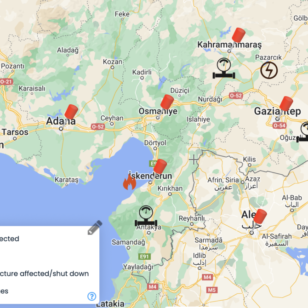Crude oil prices are likely to stabilise around mid-50 dollars per barrel in 2017 as Members of the Petroleum Exporting Countries (OPEC) and non-OPEC members have agreed to cut production.
“The recent OPEC-Russia deal should be enough to provide support for the oil price around the mid-$50s per barrel (Brent) until the early spring. After that I think we will see weaker oil through the summer, because of higher supply, before some recovery again in the autumn,” Chris Weafer, a partner at Macro-Advisory, a Moscow-based consultancy, told New Europe, adding that overall he is predicting an average oil price of $55 per barrel Brent for 2017, up from $45 per barrel in 2016.
Justin Urquhart-Stewart, Founder of London’s Seven Investment Management, told New Europe that “compared to what we have seen the last couple of years this could be the year when we see a little bit more stability. We’ve seen the price rise to a new range of 50 to 60 and at that sort of level, assuming that most of the participants in OPEC and non-OPEC stay with the deal and, of course, quite a lot of them won’t, I think there is a reasonable chance it will stay within that range because it is in everybody’s interest to do so”.
Urquhart-Stewart noted that it’s going to be painful for the producers. “It’s certainly better than 30 dollars but they should not expect that it going to be getting anywhere near 100 dollars anytime soon,” he said.
Weafer warned that the biggest danger for oil is the fact that Libya’s National Oil Company is now in a position to start rebuilding production and exports and may be able to boost output to around 750,000 barrels daily in the second quarter. He explained that Libya has declared an ambitious target of 1.1 million barrels per day by end 2017 but that will be hard to achieve given the scale of war damage to be repaired. OPEC has only built in average production of 510,000 barrels per day for Libya whereas current production is already above that and climbing.
In addition, OPEC’s November deal assumes that Nigeria will not be able to restore production lost because of the attacks by the Movement for the Emancipation of the Niger Delta (MEND), whereas historically Nigeria has always been able to do so after a few months, Weafer said. The OPEC agreement assumes Nigeria’s output will stay at 1.57 million barrels per day while earlier in 2016 the country’s output averaged 1.90 million barrels per day.
“I assume that compliance from Russia, the non-OPEC countries and from the OPEC countries other than Saudi, Kuwait and the UAE will be weak and that should undermine the price in Q2. Supply will be higher than expected,” the Russia-based expert told New Europe.
“I don’t see the oil price pushing much higher than the mid to high $50’s per barrel (Brent) even if a miracle happened and all countries stuck tightly to the production cut agreement. That is because US shale volume recovery will accelerate at, and above, $55 per barrel. Already we see that the total number of rigs returning to suspended US shale projects is climbing steadily and many operators are planning to boost activity,” Weafer said. With the big drop in production costs see in the US shale industry in 2015 and 2016, for example, technology and efficiency gains, it is generally accepted that $55 per barrel is now the decisive price, Weafer said, reminding that it used be $63 per barrel only 12 months ago.
Urquhart-Stewart predicted that there is still going to be more production from the US and more coming through from Russia. “I think that’s not going to decrease,” he said.
Regarding the Russian-backed Turkish Stream and Nord Stream 2 pipelines, Weafer noted that Russian President Vladimir Putin is very committed to both pipelines. “He takes the view that if you build the fixed pipelines to your customers then they will remain your customers. You will then only ever argue over price and not whether to take the gas or not,” Weafer said.
Despite the political rhetoric and German Chancellor Angela Merkel’s criticism of Russia’s role in Ukraine, Germany also wants Nord Stream 2, Weafer said, adding that it will greatly improve the country’s energy security and both countries have enjoyed a close energy relationship for the past 40 years without any problems.
Using more gas will also allow Germany to reduce coal consumption and that will help the country achieve its emission targets. “I expect Germany to ignore the criticisms from Brussels and from its neighbours, just as it did with Nord Stream 1, and go ahead with the pipeline,” the partner at Macro-Advisory said.
“Also, I expect Russia to remain committed to Turkish Stream. It makes strategic sense for Russia to have both a major northern and southern gas corridor. It will help secure Russia’s market share in Europe and, just as important, it will at least delay the construction of any competing pipelines from Central Asia and from Iran,” Weafer said.
He stressed that Russia is very pragmatic when it comes to energy deals. “It views them as both good business and good politics. The former because of the cash flow and the latter because a close energy relationship can also be used to boost other trade and investment deals and to improve political ties,” Weafer said.
Political disputes have never been allowed get in the way of strategic energy deals, i.e. as seen with Nord Stream and also the reason why Russia and Turkey restored relations so quickly. “I don’t see that the assassination of the Ambassador in Ankara will change the plans for the pipeline. Moscow sees the incident as an action by a terrorist and could have happened anywhere. It will not blame Turkey for the action. It will blame IS and will take its revenge against that group,” Weafer said.
It’s also unlikely to have a new Ukraine gas crisis. “The circumstances no longer exist. Ukraine is much less dependent on Russian gas than it was in 2006 or 2009 and has managed to diversify sources. More importantly Ukraine is now entirely reliant on the political goodwill of the EU and would not risk any action, for example, to disrupt gas flows to Gazprom’s EU customers, for which it might be blamed,” Weafer said, adding that equally, Russia and Brussels have moved more closely to some sort of grand deal over gas and I cannot see the Kremlin risking a reversal of that progress.
Urquhart-Stewart said that there would be some geopolitical difficulties, “depending, of course, not just the relationship with regards to Russia and Ukraine and the Eastern states but also because of whatever the behaviour is coming from across the Atlantic as well. If there is closer relationship, which I frankly not sure I can really see, between (US President-elect Donald) Trump and Russia then that could ease the relationship somewhat but I think the geopolitical problems coming of Europe with Russia are still going to be very, very difficult”.
Weafer reminded that the recent deal to sell a 19.5% stake in Russian oil giant Rosneft to a consortium of Glencore and the Qatar Investment Authority plus earlier deals involving India’s ONGC at Russia’s Vankor field and Chinese investors at Russia’s Yamal liquefied natural gas (LNG) project shows that big energy deals are continuing despite sanctions. “But it is expected that once sanctions start to ease then we will see more investment deals in Russia, including in the energy sector,” Weafer said.
Initially published by New Europe.



